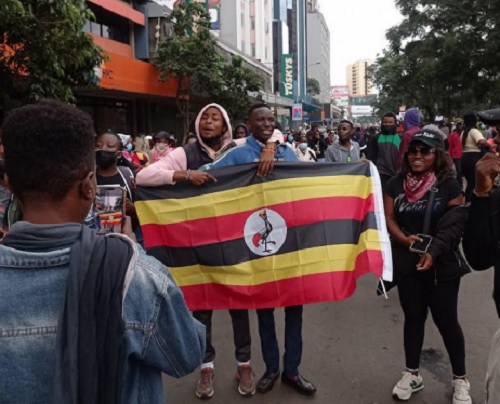
Same grievances of corruption and impunity, but can the July 23 march on Uganda’s parliament succeed?
ANALYSIS | IAN KATUSIIME | Shortly before 3pm on June 25, something unexpected happened in Westlands, an affluent suburb of Nairobi. Cars started making U-turns with motorists warning oncoming traffic about what lies ahead. The protests against an unpopular Finance Bill introduced by the Kenyan government had spread from the central business district of Nairobi to this leafy neighbourhood where all was largely expected to be normal. It was contagion.
The protests led by the Gen Z youth presumed to be born after 1997 had brought Kenya to a standstill paralysing the cities of Nakuru, Eldoret, Mombasa and Kisumu for a week. The angry and energised youth donning flashy clothing and exuding confidence unseen in the region had even done something more daring: they stormed the National Assembly and set sections of it ablaze.
They broke doors, ran roughshod over the legislative house, smashing everything in their wake in a climax of the anger that has gripped the East African nation since the Bill was tabled last year. It was an unprecedented moment even for Kenya which has a strong protest culture.
The events in Kenya are taking place at a time of growing angst over the rising cost of living, corruption and repressive rule in African countries. The same reasons have spurned coups in Central and West Africa.
In Uganda, the contagion was felt on the day of the protests when Ugandans complained about the internet connection slowing down prompting speculation that the Ugandan government had fiddled with it wary of the domino effect.
The freewheeling youngsters have populated social media with hashtags #OccupyParliament#RejectFinanceBill2024#RutoMustGo and left a region led by strong men in awe.
Now, Ugandan activists in the spirit of Kenya have organised a march to parliament slated for July 23 aimed at highlighting the rot and impunity at the August House. They are angry that each year, the corruption at parliament escalates and now MPs are openly justifying it.
But when videos of Kenyans being abducted by commandos in black vans surfaced, it appeared the Kenyan state had taken a page out of Uganda’s playbook. Raids at dawn where influential online figures were whisked away are an all too familiar scenario in Uganda.
Kenya contagion spreads
The protests in Kenya have also ignited debate on the situation in Uganda where there is endless agitation for political reforms. Uganda has been ruled by President Yoweri Museveni for 38 years and the lack of a clear roadmap for the country regarding his succession tends to leave many people on edge.
“Uganda is where Kenya was twenty years ago,” a Kenyan journalist described Uganda’s political landscape as such. To Kenyans, Museveni’s long stay in power evokes memories of Daniel arap Moi, Kenya’s longest serving president, who held absolute power for 24 years until he was forced to hand over power by a coalition of democratic forces.
The fear of the contagion struck a chord in some respects when President Museveni held an impromptu meeting with newly appointed Inspector General of Police Abbas Byakagaba at State House Entebbe on the afternoon of June 26 just as Kenya’s Ruto was yielding to pressure by the Gen Z protestors.
President Museveni is known as an ally of President Ruto in spite of the occasional disagreements. The Kenyan leader treats Museveni as a mentor and he accorded him special recognition during his inauguration in 2022. Critics described Ruto’s first speech after the protests where he said “criminals” had hijacked the demonstrations as Museveni-esque.
When Uganda House, the home of the Ugandan mission in Kenya, was set on fire during the unrest, it appeared to play right into the proximity of the two countries’ politics. It was not clear whether it was police teargas or protestors that caused the fire but it was part of the unintended consequences of the decision making of Nairobi’s political elite.
Grave questions for Ruto
President Ruto, fresh from schmoozing with U.S. President Joe Biden in an extravagant state visit just a month ago, now faces grave questions about young Kenyans gunned down by police two days after he said he would engage them.
Barely two years in office, the Kenyan leader is under pressure over excessive travel, the Finance Bill, alleged corruption and a “persistent failure to address the pressing needs of our nation” as a statement endorsed by protesters indicated.
He has been praised and equally criticised for his handling of the crisis. Significantly, after some initial defiance, he bravely succumbed to pressure and withdrew the Bill a day after the parliament passed it.
“The protests which were largely peaceful and driven by the youth was evidence that Kenya is maturing as a democracy,” said Nico Minde, a researcher with Institute of Security Studies in Nairobi. President Ruto’s climb down from his tough rhetoric indeed seemed like a sign of a maturing democracy.
But damage has been done and the exasperation in Kenya festers. The day Ruto conceded to the demands of the protesters, Kenyans poured out their rage in a space on X that attracted a staggering 132,000 listeners. The President was criticised when he ordered the deployment of the Kenya Defence Forces in Nairobi as protestors planned to march on State House Kenya.
The same rage fueled a well-attended march in Nairobi on June 27 to honour those who were killed by police earlier. More than ten thousand young people, whose patience has run out with President Ruto, took to the streets of Nairobi and other cities, clashing with security forces and resulting in the killing of 23 young Kenyans at the last count. Widespread reports indicate there was a police massacre of civilians in a place called Githurai outside Nairobi.
Same grievances
As the youth of Kenya swept up Nairobi, Ugandans on X were also torching up their MPs online with a new hashtag #TextTheThief in reaction to the endemic corruption at Parliament with Speaker Anita Among the main subject of the condemnation.
A number of MPs have been arrested and are facing graft-related charges. Weeks ago, fear gripped the House after police summoned more than 30 legislators over embezzlement inquiries. A citizen-led effort has been key in getting the MPs to face the music under the #UgandaParliamentExhibition that has been running since the year started.
The campaign has relied on the same energy that the Kenyans have drawn on to turn guns on their elected representatives in the last few days of the Finance Bill which is now out of the way. Angry protestors vandalised property of Kenyan MPs who passed the Bill.
In a dramatic sign of what the demonstrators achieved, some of the lawmakers have come out to ask for forgiveness for voting for the Bill that has claimed lives.
Ugandan voters have not been as wrathful as their Kenyan counterparts so far but the anger is palpable.
The Ugandan expose by activists under Agora Discourse pinned Speaker Among over her lavish spending and illicit wire transfers disguised as parliamentary work where she was allegedly handling cash flow of over Sh400 million on a daily basis.
In addition, Parliament Commissioners drew the ire of the public when it came to light that they had allotted themselves Shs1.7 billion in a “service awards” scheme. At the centre of the saga is Mathias Mpuuga, former Leader of Opposition, who was awarded Shs500 million, purportedly for his work in the position, to the chagrin of his party and the public.
Analysts say President Museveni attempted to take advantage of the public mood against MPs and issued directives to police who made swoops on them for a number of corruption-related cases. After weeks of arrests and interrogations, Speaker Among and her MPs are now fighting back at a time of intense pressure on the lawmakers and in the process drawing more ire.
The Speaker under fire from the President, international sanctions, and a restless public, sent parliament on recess with a clear motive. Days after, Among and MPs attended an event to stand in solidarity with Cissy Namujju, Woman MP for Lwengo, who was arrested for allegedly soliciting a bribe from Uganda Human Rights Commission.
Among led MPs in justifying acts of corruption with implicit statements that that the President has their back. The decision to go on recess also appears to have nixed a censure motion against the four parliament commissioners who benefited from the service awards.
At the rally in Lwengo, central Uganda, Juliet Kinyamatama, Rakai Woman MP, shocked many observers when she openly defended Namujju saying the detained MP was sharing the loot with her constituents. Her comments elicited applause from the electorate but drew anger from sections of the public illustrating the chasm at the heart of Ugandan society.
The event provoked indignation and prompted the hashtag #TextTheThief where activists urged Ugandans to call all corrupt legislators and bombard them with questions about corruption. The fury over parliamentarians in Uganda and Kenya is happening at the same time. But how will Museveni react if Ugandan activists, in the spirit of Kenya, attempt to march on parliament on July 23?
 The Independent Uganda: You get the Truth we Pay the Price
The Independent Uganda: You get the Truth we Pay the Price



